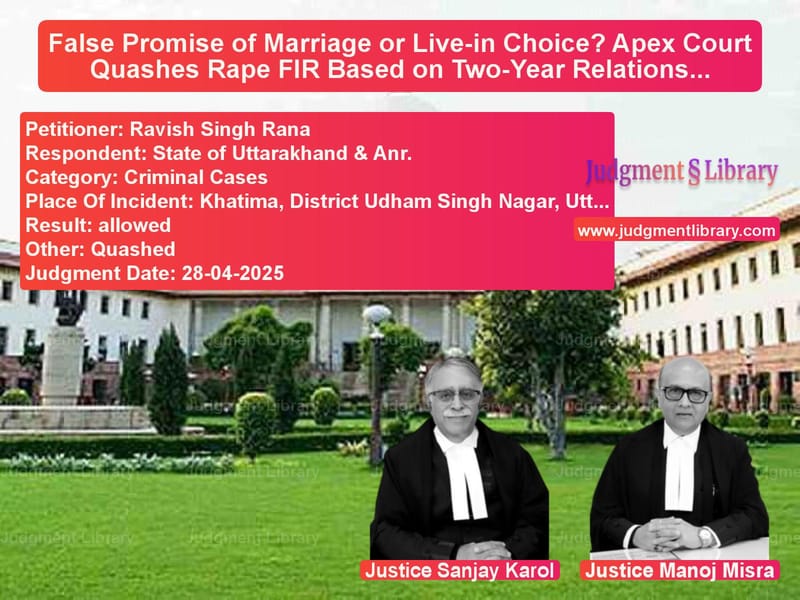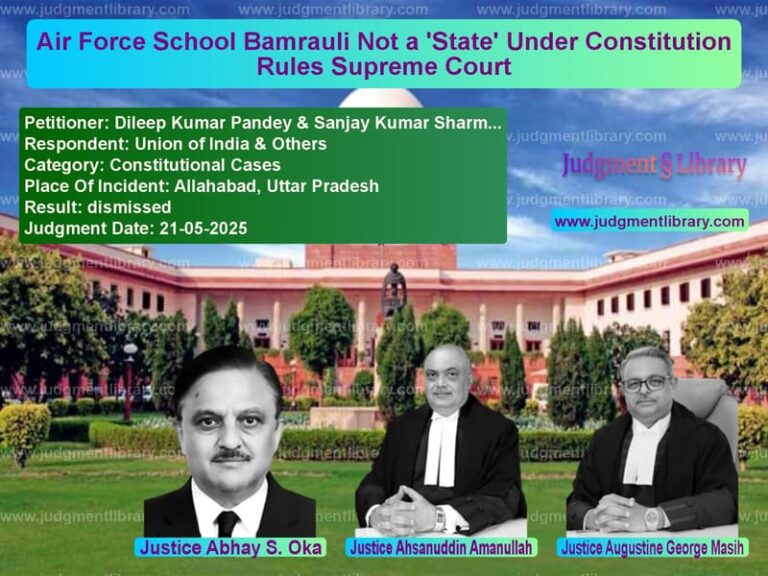False Promise of Marriage or Live-in Choice? Apex Court Quashes Rape FIR Based on Two-Year Relationship
In a significant judgment addressing the complex intersection of live-in relationships and criminal liability, the Supreme Court of India recently quashed an FIR filed under Section 376 (rape) of the Indian Penal Code against Ravish Singh Rana. The case raises critical legal and social questions about consent, the legitimacy of long-term relationships without formal marriage, and whether a false promise to marry can be grounds for criminal prosecution. With deep analysis, the Court concluded that a consensual relationship over two years cannot be later claimed as non-consensual merely because it did not culminate in marriage. This ruling is not only important for interpreting the law but also reflects evolving societal norms in India.
The Genesis of the Case
The matter began when a woman lodged FIR No. 482 of 2023 at Police Station Khatima, District Udham Singh Nagar, Uttarakhand. She alleged that she had met Ravish Singh Rana through Facebook in February 2021, following which they entered into a live-in relationship. According to the FIR, the appellant rented a room in Khatima where they began living together. The complainant alleged that they engaged in physical relations based on a promise of marriage. She further claimed that when she insisted on marriage, the appellant refused and allegedly forced himself on her on November 18, 2023. The FIR invoked Sections 376, 323, 504, and 506 of the IPC.
In response, the appellant moved the High Court of Uttarakhand, seeking to quash the FIR under Section 528 of the Bharatiya Nagarik Suraksha Sanhita, 2023 (BNSS), formerly Section 482 of the Code of Criminal Procedure. The High Court rejected the plea, holding that the FIR disclosed cognizable offences and thus could not be quashed at the preliminary stage. Aggrieved, the appellant approached the Supreme Court.
Appellant’s Argument
The counsel for Ravish Singh Rana argued that the FIR was malicious and unfounded. He emphasized a mutual settlement agreement executed between the parties on November 19, 2023—just one day after the alleged assault. The agreement stated:
“The agreement has been made today 19.11.2023 between the first party and the second party. On the advice of respected persons and considering that both are living together since 12th August, we must conduct Mangbhari and live like husband and wife. We would hand over our papers today to the Advocate to register the marriage. If the second party violates the agreement, legal action can be taken. We both have known each other since February 2021. We love each other.”
The appellant contended that the existence of such an agreement negated the allegation of any forced sexual act on November 18. He further argued that the FIR was a tool to blackmail him and his family, pointing out the lack of injury or medical reports to support the allegations.
Respondents’ Counter
Represented by Ms. Vanshaja Shukla, the respondents argued that the agreement itself laid down the condition that if the appellant failed to formalize the marriage, legal action could be initiated. Since the marriage was never solemnized, the FIR and subsequent action were justified. They further claimed that the physical relationship was induced by a false promise of marriage and hence vitiated consent. The counsel referred to the landmark case of Pramod Suryabhan Pawar v. State of Maharashtra, where the Supreme Court had held that consent obtained under a false promise of marriage would not be considered valid.
Key Judicial Observations
The bench comprising Justices Sanjay Karol and Manoj Misra examined the relationship timeline, evidence, and legal principles with great care. The Court noted:
“This relationship was not merely of knowing each other but of living together as a couple under one roof in a rented accommodation. The FIR does not allege that physical relationship was established only because there was a promise of marriage.”
On the nature of long-term relationships and their implication on consent, the Court said:
“In our view, if two able-minded adults reside together as a live-in couple for more than a couple of years and cohabit with each other, a presumption would arise that they voluntarily chose that kind of a relationship fully aware of its consequences.”
The judgment carefully distinguished between false promises and mere breach of promise. Referring to Pramod Suryabhan Pawar, the Court reiterated:
“To establish a false promise, it would have to be demonstrated that the maker of the promise had no intention of upholding his word at the time of making the promise.”
It cited Deepak Gulati v. State of Haryana to reiterate that courts must assess if consent was guided by deliberate deceit or if the relationship evolved mutually.
“An accused can be convicted for rape only if the court reaches to a conclusion that the intention of the accused was mala fide, and that he had clandestine motives.”
Final Reasoning and Verdict
Having reviewed the facts and applying precedent, the Court found that the long-term consensual nature of the relationship—coupled with the absence of any coercion or threat till the filing of the FIR—did not support a rape charge. On the existence of a love-based settlement agreement a day after the alleged incident, the Court found it highly improbable that a victim of rape would voluntarily enter into such a pact.
“The long-drawn relationship of the appellant and the second respondent, including the circumstance of their living together and cohabiting with each other, that too in a separate rented accommodation, would give rise to a presumption that their relationship was based on a valid consent.”
Therefore, the Court concluded that the FIR was an abuse of judicial process:
“The impugned first information report and the consequential proceedings in pursuance thereof are nothing but abuse of the process of the court and the same deserves to be quashed.”
Conclusion
This landmark judgment reflects a matured judicial approach to interpreting live-in relationships in modern India. It distinguishes clearly between real exploitation and post-breakup allegations rooted in personal grievance. The ruling acknowledges that adult individuals can choose to be in consensual relationships without marriage, and that the failure of such relationships does not automatically convert them into criminal offences. This clarity is especially crucial in cases where emotional ties dissolve, and legal systems risk being misused for retribution. The judgment reinforces the principle that courts must carefully balance the rights of individuals to love, live, and leave relationships against the misuse of criminal law in personal disputes.
Petitioner Name: Ravish Singh Rana.Respondent Name: State of Uttarakhand & Anr..Judgment By: Justice Sanjay Karol, Justice Manoj Misra.Place Of Incident: Khatima, District Udham Singh Nagar, Uttarakhand.Judgment Date: 28-04-2025.Result: allowed.
Don’t miss out on the full details! Download the complete judgment in PDF format below and gain valuable insights instantly!
Download Judgment: ravish-singh-rana-vs-state-of-uttarakhand-supreme-court-of-india-judgment-dated-28-04-2025.pdf
Directly Download Judgment: Directly download this Judgment
See all petitions in Fraud and Forgery
See all petitions in Bail and Anticipatory Bail
See all petitions in Other Cases
See all petitions in Judgment by Sanjay Karol
See all petitions in Judgment by Manoj Misra
See all petitions in allowed
See all petitions in Quashed
See all petitions in supreme court of India judgments April 2025
See all petitions in 2025 judgments
See all posts in Criminal Cases Category
See all allowed petitions in Criminal Cases Category
See all Dismissed petitions in Criminal Cases Category
See all partially allowed petitions in Criminal Cases Category







